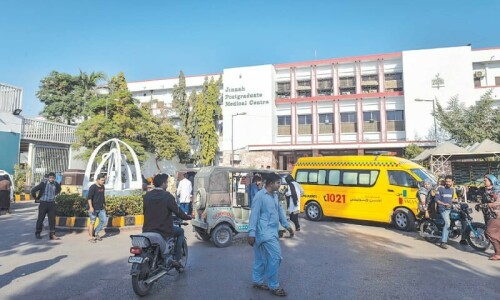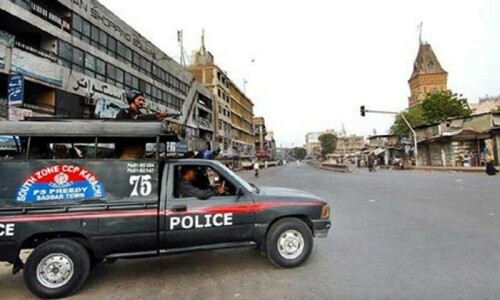KARACHI: How many times does it happen that two speakers at an event fail to complete their speeches or stop midway because they are choked with emotion? Very rarely. It happened on Friday evening at an event held at the Arts Council in memory of the distinguished scholar and writer Dr Aslam Farrukhi, who passed away on June 15.
Though writer Asif Farrukhi, one of the two sons of Dr Aslam Farrukhi, tried to speak the way he usually does, he could not control his feelings and left the podium without rounding off his speech. He said he wouldn’t talk about his father’s intellectual and creative accomplishments and would rather like to shed light on his personality. He said he worked very hard throughout his life. He said Dr Aslam came from an affluent background but there was a time when his family faced a financially challenging period. He said after partition when his family migrated to Karachi, Dr Aslam took care of his parents and children, and during his life as a student here, hard work and diligence became a habit for him. He said whatever the late writer acquired in life he did that through his own efforts. Apart from that, he said, he was a contented soul. He said if he got something, he would be happy, and if he didn’t get something that he wanted, he would not regret it. He said Dr Aslam got the professorship at Karachi University at a late time in his career.
Asif Farrukhi said Dr Aslam Farrukhi had tremendous self-esteem; he never accepted material help from anyone. He said he was a very cultured person who always dressed well. He said when he was teaching at S.M. College, he saw a young teacher who wore beautiful suits. That young man was Zulfikar Ali Bhutto who took him (Dr Aslam) to his tailor and the tailor made a suit for the scholar. When the bill for the dress came, it put Dr Aslam in financial strife, due to which he said to Mr Bhutto ‘Please never take me to your tailor again’. He said both Mr Bhutto and his father remembered each other. After coming to power Mr Bhutto, he said, used to send a card to Dr Aslam every year. Despite the fact, he said, that Dr Aslam did not generally like to keep cards, he kept Mr Bhutto’s.
‘He kept Bhutto’s cards’
Asif Farrukhi said Dr Aslam himself chose his gravesite in the Karachi University graveyard, took an NOC, made a file and told his children where the file was. He said two months back he asked him to make his (Dr Aslam’s) identity card because it would be required at the time of burial. He said only 15 days after getting the card, he died. At this juncture Asif Farrukhi had a lump in his throat and moved away from the podium.
Dr Fatema Hassan, who did her PhD under Dr Aslam Farrukhi, was also invited to share her memories of the late scholar. She told the audience in a trembling voice that she wouldn’t be able to say anything.
Writer Masood Ashar, who spoke via telephone from Lahore, said no one wrote the kind of Urdu that Dr Aslam did. He said his language was not flowery, rather it had everyday idiom. He said the biographical sketches that he penned were so lucid that the reader was able to visualise the person he wrote about. He said the scholar was a great admirer of Hazrat Nizamuddin Aulia and Amir Khusrau, and that’s the kind of religious values that we should now have because today artists in our society were being killed.
Prof Sahar Ansari said in 1974 he joined University of Karachi as a lecturer. He said Dr Aslam’s room was next to his because of which they would regularly interact with each other. He said he was a well-dressed, cultured, and witty person who had a photographic memory.
Renowned critic Prof Shamim Hanafi addressed the audience via telephone from Delhi. He began by telling the attendees how long his association with the writer had been. He said the news of his valuable work on Mohammad Husain Azad had reached India before his book. About his biographical sketches, he said what stood out in them was his humanism. He said he wrote sketches of ordinary men because he saw beauty in ordinary individuals.
Writer Zahida Hina touched upon Dr Aslam’s work on Azad and his deep devotion to Hazrat Nizamuddin Aulia and Amir Khusrau. She said he wrote three books — Dabistan-i-Nizam, Nizam Rang and Sultanji — on the Sufi saint.
Nilofur Abbasi, Sarwar Javed, Prof Anis Zaidi, Mubin Mirza and Ambreen Haseeb Amber also spoke. Ahmed Shah hosted the programme.
Published in Dawn, June 25th, 2016













































Dear visitor, the comments section is undergoing an overhaul and will return soon.